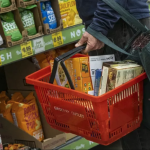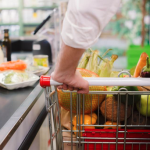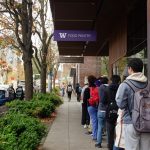In the News

Navigating unhealthy food culture on college campuses
April 27, 2025 | The Seattle Times
Michelle Averill is interviewed by a first year UW student and offers advice for healthy eating choices as a busy college student. She offers advice to think ahead and identify which food feel the most nourishing to you. This article appears in a series contribution by Washington youth through The Seattle Times Student Voices project.
Read article
Gobsmacked by groceries, Inflation inching higher for Washington consumers weary at the market
February 16, 2025 | The Spokesman Review
The Spokesman Review highlights both the national trends of food costs, as well as Washington state trends, pointing to a report released in February from the Washington State Food Security Surveys, showing that state residents continue to worry about food prices.
Read article
UW, WSU study shows WA residents struggling to pay for one particular monthly expense
February 17, 2025 | The Bellingham Herald
This article by the Bellingham Herald highlights findings from the fifth edition of the Washington State Food Security Survey released on Feb. 13, revealing a potential rise in food insecurity in Washington.
Read article
Grocery prices are a top financial worry, WA residents say
February 19, 2025 | The Seattle Times
The Seattle Times looks at the growing high cost of food for Washington households, citing a state-wide survey conducted by UW Food Systems researchers called WAFOOD. FSNH faculty member Marie Spiker is quoted, “Of all the indicators that we have of how are households doing financially, food insecurity is a really important one, because it has these close ties to human health.”
Read article
Autumn 2024 marks highest demand in UW Food Pantry history
January 6, 2025 | UW Daily
UW Food Pantry donations for fall quarter of 2024 included 12% of donations from food drives, 11% from individual donations, and 15 to 20% came from on-campus dining facilities. Through work conducted by student capstone teams in winter 2024, the Pantry gleans unused food from UW in order to increase sustainability in providing resources to its patrons.
Read article
Mayor Harrell Releases Updated “Food Action Plan” to Guide City Policies and Programs, Increase Food Security in Seattle
September 5, 2024 | City of Seattle
Yona Sipos, core faculty in the Food Systems, Nutrition, and Health program is quoted in this recent post by the City of Seattle Mayor’s office, remarking, “The recently updated plan provides an impressive vision of how we can all pursue equity, sustainability, and resilience for our City and region. Food and food systems can truly act as unifying themes for communities, and the Plan’s level of detail provides clear goals and strategies to connect, learn, and contribute positively — which many of us at the University of Washington anticipate doing with students across the Food Systems, Nutrition, and Health program, among others.”
Read article
Project 2025 Calls for Major Cuts to the US Nutrition Safety Net
August 28, 2024 | Civil Eats
Civil Eats spoke with Assistant Professor Pia Chapparro about the potential devastating impacts that Project 2025 could have on food security and hunger if SNAP work requirements were tightened. Chapparo cites existing research and said, “Research shows that SNAP participation reduces food insecurity but does not act a disincentive to work. Moreover, research shows that the work requirements don’t lead to increased employment.”
Read article
The health benefits of fruits and vegetables: taste the rainbow
August 12, 2024 | The Whole U
UW Medicine Dietitian and alumna (MPH/GCPD ’22) Anna Fogel breaks down the health benefits of fruits and vegetables in an article published by The Whole U. Fogel give a dietitian’s perspective on the health benefits of getting a variety in your diet, as well as the benefits by color.
Read article
Faculty profile: Anne Lund
March 13, 2024 | Faculty profile, UW Food Systems, Nutrition, and Health
Graduate Coordinated Program in Dietetics Program Director Anne Lund discusses her ongoing initiative to integrate topics related to equity, diversity, and inclusion into the University of Washington’s two-year dietetics curriculum.
Read article
New book explains the connection between food and fertility
April 26, 2024 | King-TV
Dr. Angela Thyer and Registered Dietician and Clinical Instructor Judy Simon talk about their book “Getting to Baby” on Seattle’s New Day Northwest, explaining how diet and lifestyle can affect fertility.
Read article